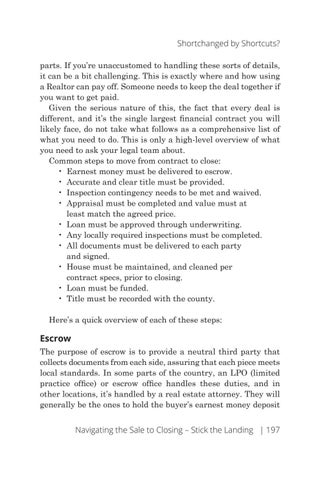Shortchanged by Shortcuts? parts. If you’re unaccustomed to handling these sorts of details, it can be a bit challenging. This is exactly where and how using a Realtor can pay off. Someone needs to keep the deal together if you want to get paid. Given the serious nature of this, the fact that every deal is different, and it’s the single largest financial contract you will likely face, do not take what follows as a comprehensive list of what you need to do. This is only a high-level overview of what you need to ask your legal team about. Common steps to move from contract to close: • Earnest money must be delivered to escrow. • Accurate and clear title must be provided. • Inspection contingency needs to be met and waived. • Appraisal must be completed and value must at least match the agreed price. • Loan must be approved through underwriting. • Any locally required inspections must be completed. • All documents must be delivered to each party and signed. • House must be maintained, and cleaned per contract specs, prior to closing. • Loan must be funded. • Title must be recorded with the county. Here’s a quick overview of each of these steps:
Escrow The purpose of escrow is to provide a neutral third party that collects documents from each side, assuring that each piece meets local standards. In some parts of the country, an LPO (limited practice office) or escrow office handles these duties, and in other locations, it’s handled by a real estate attorney. They will generally be the ones to hold the buyer’s earnest money deposit Navigating the Sale to Closing – Stick the Landing | 197




